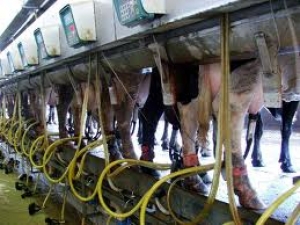World Markets

Dairy Australia Manager, Strategy and Knowledge Joanne Bills said Australia’s milk production was up 3.6 per cent on last season for the six months to December at 5.6 billion litres and expects the trend to continue.
“Generally favourable seasonal conditions, lower feed costs, good soil moisture levels and high water allocations should support profit margins and make this season one of consolidation for most dairy farmers in southern exporting regions,” Ms Bills said.
“Northern and western Victoria, and southern New South Wales are enjoying the best conditions for many years, and Tasmanian production remains strong.”
However, Ms Bills said milking cows remain in short supply and retention rather than export of heifers would be critical to maintaining future production growth. Live cattle exports have slowed, down 4 per cent to 73,900 in the 12 months to December 2011.
On the global scene, while dairy markets have been remarkably stable, the wider economic situation remains uncertain. Currency movements are impacting the competitiveness of exporters.
“The high Australian dollar will continue to limit returns to local exporters, while EU exports are becoming increasingly competitive and exports more attractive for US manufacturers,” Ms Bills said.
“Dairy Australia modelling indicates an increase in the Australian dollar from 105 to 110 US cents would reduce farmgate prices by 2.2 cents per litre. Exchange rates will have an impact on 201213 farmgate prices, as exporters have hedged a large proportion of current season sales, but will be more exposed to high and changeable exchange rates in the coming year.”
Analysis undertaken as part of the Situation and Outlook Update suggests a likely final average southern Australian farmgate milk price range of $5.20 to $5.30 per kilogram of milk solids for the 2011/12 season.
While Australia’s production is on the rise, so too is production across the US, UK, Germany, France and the Netherlands. It is a different picture compared to 12 months ago when global dairy supplies were limited. Ms Bills said the outlook for the international dairy market was critically dependent on demand for dairy products continuing to absorb additional milk supply.
“Demand has been resilient in key Asian markets and the Middle East. There have been concerns that US and EU dairy consumption would fall as a result of their continued economic woes, however, product sales have increased or remained steady,” Ms Bills said.
Chinese WMP imports slowed in the second half of 2011, finishing the year down 1.8 per cent on 2010. However, this is still around twice as high compared to three years ago. Total Chinese dairy imports have increased more than 20 per cent.
Ms Bills said the Australian dairy market had been fairly positive over recent months, despite ongoing consumer cautiousness.
“Domestic sales volumes have lifted for all the key dairy categories; but only very marginally for cheese and yogurt. While domestic sales volumes for milk have grown, value has been undermined by lower supermarket prices,” Ms Bills said.





















